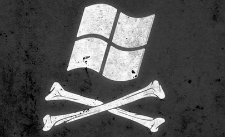 It’s no secret that the Windows operating system is one of the most widely pirated pieces of software in the world.
It’s no secret that the Windows operating system is one of the most widely pirated pieces of software in the world.
Microsoft is not happy with this fact as it costs the company millions in lost revenue, but new research suggests that Linux adoption is being hurt as well.
New findings published by Norwegian economics researcher Arne Rogde Gramstad show that software piracy significantly decreases the adoption of desktop Linux distributions.
In a paper titled “Software Piracy and Linux Adoption” Gramstad examines the relationship between local software piracy rates (based on BSA’s data) and the use of Linux as a desktop operating system, while controlling for potentially interfering factors such as the gross domestic product per capita and local anti-piracy efforts.
This results in a model which predicts that more people would use Linux if software piracy in general was less prevalent in a country.
“I find that an increase in the piracy rate by 1% in a country is expected reduce the user share of Linux by around 0.5%. Although there is some level of uncertainty on the exact estimate, the direction is negative with a high level of statistical certainty,” Gramstad explains to TorrentFreak.
This means that if all piracy was to disappear the number of Linux users would increase by 50%. While that’s an impressive number, the relative impact is modest. In most countries Linux is used by roughly 1% of desktop users, which would increase to 1.5%.
It does bring up an interesting issue though, as it suggests that Microsoft’s dominant position is actually reinforced through piracy.
“I think the results highlight that there are costs to software piracy besides losses to corporate profits,” Gramstad tells TF
“For operating systems, piracy has contributed to Windows’ dominant position, which in effect has undermined competition from open-source alternatives like Linux.”
More research is needed to see how other external factors may influence the relationship between piracy and Linux adoption, but Gramstad is confident that the direction of the results is stable.
While it’s doubtful that Microsoft is going to start encouraging piracy, the results show that the effect of software piracy is not always as straightforward as one would think.





